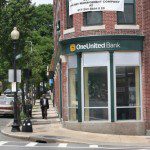At the center of the ethics controversy enveloping Rep. Maxine Waters, a California Democrat, is OneUnited, the nation’s largest African-American-owned bank.

The House ethics committee announced three charges against Waters today, alleging that she improperly used her office to help the bank, in which her husband had a financial stake.
The Investigative Reporting Workshop at American University points out that OneUnited was the weakest bank to receive bailout money at the time of its rescue, though that part of the bailout was intended to help healthy banks:
When then-Treasury Secretary Henry Paulson announced creation of the so-called “Capital Purchase Program” in October 2008, he said it was directed at “healthy institutions.” Nevertheless OneUnited Bank of Boston received a $12.1 million capital injection from the Treasury Department on Dec. 19, 2008.
That OneUnited wasn’t exactly a “healthy institution” isn’t new. As we pointed out last week, a month before the Treasury awarded OneUnited bailout money, regulators at the FDIC had accused its management of unsound banking practices and excessive executive perks.
But the bank had friends in high places. When Waters, a member of the Financial Services Committee, told her committee’s chairman, Rep. Barney Frank, about her conflicts of interest, he told her to stay out of the matter. Frank, a Massachusetts Democrat, then proceeded to help the bank on his own. From The Wall Street Journal:
A provision designed to aid OneUnited was written into the federal bailout legislation by Mr. Frank, who is chairman of the financial-services panel. Mr. Frank has said he inserted the provision to help the only African-American owned bank in his home state. He said in an interview that Ms. Waters’s interest “had zero impact on the outcome because I would have done it anyway.”
In other words, OneUnited didn’t go through the same door as the other banks, so it’s not too surprising that it got bailout money despite being weak.
Strength and weakness were calculated based on banks2019 ratio of Tier 1 capital (that’s equity and disclosed reserves) to total assets. The FDIC requires banks to have at least a Tier 1 ratio of 3 or 4 percent, depending on their classification. According to the Investigative Reporting Workshop, OneUnited’s Tier 1 ratio was just 1.8 percent in the quarter before it received bailout money.
OneUnited representatives did not comment for the Investigative Reporting Workshop story. Frank has said he has no regrets about helping the bank.
But despite its $12 million influx of federal cash, the bank still ranks among the worst of those bailed out. The bailout money has not been repaid, and OneUnited has not yet met all the goals of the corrective plan set forth by federal and state regulators, according to the Investigative Reporting Workshop.
Unlike most of the other banks, the piece pointed out, OneUnited’s financial troubles were 201Cnot primarily due to bad loans or subprime lending, but were instead due to its Fannie Mae and Freddie Mac investments.
by Marian Wang
ProPublica


